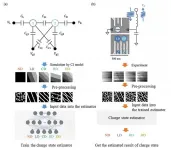(Press-News.org) Children learn much about self-regulation – that is affective, mental, and behavioral responses to certain situations – during their first few years of life. Some of these behaviors are about children’s ability to choose a deliberate response over an automatic one. This is known as effortful control, which is learned from the environment, first and foremost through children’s relationship with their parents.
In recent years, giving children digital devices to control their responses to emotions, especially if they’re negative, has become common. Now, a team of researchers in Hungary and Canada has investigated if this strategy, referred to as parental digital emotion regulation, leads to the inability of children to effectively regulate their emotions later in life. The results were published in Frontiers in Child and Adolescent Psychiatry.
“Here we show that if parents regularly offer a digital device to their child to calm them or to stop a tantrum, the child won’t learn to regulate their emotions,” said Dr Veronika Konok, the study’s first author and a researcher at Eötvös Loránd University. “This leads to more severe emotion-regulation problems, specifically, anger management problems, later in life.”
More devices, less control
“We frequently see that parents use tablets or smartphones to divert the child’s attention when the child is upset. Children are fascinated by digital content, so this an easy way to stop tantrums and it is very effective in the short term,” Prof Caroline Fitzpatrick, a researcher at the Université de Sherbrooke and senior author of the study, explained. However, the researchers expected that in the long run, the practice has little benefit. To confirm their thesis, they carried out an assessment in 2020 and a follow-up one year later. More than 300 parents of children aged between two- and five-years-old completed a questionnaire which assessed child and parent media use.
They found that when parents used digital emotion regulation more often, children showed poorer anger and frustration management skills a year later. Children who were given devices more often as they experienced negative emotions also showed less effortful control at the follow-up assessment.
“Tantrums cannot be cured by digital devices,” Konok pointed out. “Children have to learn how to manage their negative emotions for themselves. They need the help of their parents during this learning process, not the help of a digital device.”
Helping parents support children
The researchers also found that poorer baseline anger management skills meant that children were given digital devices more often as a management tool. “It’s not surprising that parents more frequently apply digital emotion regulation if their child has emotion regulation problems, but our results highlight that this strategy can lead to the escalation of a pre-existing issue,” Konok said.
It is important not to avoid situations that could be frustrating to the child, the researchers pointed out. Instead, it is recommended that parents coach their children through difficult situations, help them recognize their emotions, and teach them to handle them.
To equip parents of children with anger management problems for success, it is important that they receive support, the researchers said. For example, health professionals working with families could provide information on how parents can help their children manage their emotions without giving them tablets or smartphones. “Based on our results, new training and counselling methods could be developed for parents. If peoples’ awareness about digital devices being inappropriate tools for curing tantrums increases, children’s mental health and well-being will profit,” Fitzpatrick concluded.
END
Kids given ‘digital pacifiers’ to calm tantrums fail to learn how to regulate emotions, study finds
Researchers found that when children are given digital devices to calm their tantrums, they don’t learn how to regulate their emotions, which could lead to severe problems later in life
2024-06-28
ELSE PRESS RELEASES FROM THIS DATE:
No evidence that England’s new ‘biodiversity boost’ planning policy will help birds or butterflies
2024-06-28
A new legal requirement for developers to demonstrate a biodiversity boost in planning applications could make a more meaningful impact on nature recovery if improvements are made to the way nature’s value is calculated, say researchers at the University of Cambridge.
From 2024, the UK’s Environment Act requires planning applications to demonstrate an overall biodiversity net gain of at least 10% as calculated using a new statutory biodiversity metric.
The researchers trialled the metric by using it to calculate the biodiversity value of 24 sites across England. These sites have all been monitored over the long-term, allowing the team to compare biodiversity ...
Visual explanations of machine learning models to estimate charge states in quantum dots
2024-06-28
A group of researchers has successfully demonstrated automatic charge state recognition in quantum dot devices using machine learning techniques, representing a significant step towards automating the preparation and tuning of quantum bits (qubits) for quantum information processing.
Semiconductor qubits use semiconductor materials to create quantum bits. These materials are common in traditional electronics, making them integrable with conventional semiconductor technology. This compatibility is why scientists consider them strong candidates for future ...
The future of metals research with artificial intelligence
2024-06-28
A research team led by Professor Hyoung Seop Kim from the Graduate Institute of Ferrous & Eco Materials Technology and the Department of Materials Science and Engineering and Jeong Ah Lee, a PhD candidate, from the Department of Materials Science and Engineering, in recent collaboration with Professor Figueiredo from Universidade Federal de Minas Gerais's Department of Metallurgical and Materials Engineering in Brazil, has developed an optimal artificial intelligence model to predict the yield strength of various metals, effectively addressing traditional cost and time limitations. This research has been published in the online edition of Acta Materialia, an ...
Tissue bridges are reliable predictors of recovery from cervical spine injuries
2024-06-28
The results of the longitudinal study “Prognostic value of tissue bridges in cervical spinal cord injury” have the potential to change clinical practice. They have just been published in The Lancet Neurology, the world’s leading journal of clinical neurology. The team led by lead author Dr. Dario Pfyffer and senior author Prof. Dr. med. Patrick Freund from Balgrist University Hospital and the University of Zurich, which includes SCI experts from around the world, has successfully developed models that incorporate tissue bridges in the spinal cord in a large, multicenter cohort of patients with cervical SCI for improved prognosis of clinical outcomes. These ...
Junior rank, male sex, younger age strongly linked to ‘harmful gambling’ among UK military
2024-06-28
Several indicative factors, including junior rank, male sex, and younger age, are strongly linked to ‘harmful gambling’ among serving UK military personnel, finds an analysis of survey responses, published online in the journal BMJ Military Health.
Harmful gambling refers to the toll taken on finances, health, personal relationships, and work: nearly 1 in 4 respondents reported one or other of these effects over the past year.
The findings prompt the researchers to call for the prioritisation of better, earlier, and targeted support to stave off the harmful consequences of ...
Poorer teen mental ability linked to as much as tripling in stroke risk before age of 50
2024-06-28
A lower level of mental ability during the teenage years may be linked to as much as a tripling in the risk of having a stroke before the age of 50, finds research published online in the Journal of Epidemiology & Community Health.
The observed associations held true even after factoring in current diabetes and limiting the age of a first stroke up to 40, prompting the researchers to suggest that more comprehensive assessments beyond traditional stroke risk factors are now needed to stave off disability and death.
Recent evidence suggests that cases of stroke ...
Adults conceived by donors left behind by fertility industry
2024-06-28
Children conceived by using egg or sperm donors have the same well-being outcomes as non-donor conceived people.
However, they are more likely to have identity difficulties and issues with trust. Secrecy and anonymity about their genetic parentage can have a profound impact on well-being say authors. They warn that children and adults conceived using donor gametes have not been centred in the assisted reproductive industry and more information is needed about adult wellbeing.
The study is published today in the British Journal of Obstetrics and Gynaecology by researchers King’s College London. The study is the first systematic ...
Novel method optimizes extraction of antioxidant and colorant from jabuticaba peel
2024-06-28
Scientists at the State University of Campinas (UNICAMP) in Brazil and the University of Cadiz (UCA) in Spain have successfully deployed a novel method of extracting high-value-added chemical compounds from the peel of jabuticaba (Plinia cauliflora). The method, which simplifies the process and enhances its efficiency, is described in an article published in Journal of Food Composition and Analysis.
The aim was to optimize extraction of anthocyanin, a potent antioxidant found in strawberries, blackberries and raspberries as well as jabuticabas, among other sources. It has anti-inflammatory effects and is also a natural ...
Researchers discover how nerve cells in bat brains respond to their environment and social interactions with other bats
2024-06-28
Vienna, Austria: Researchers have found that nerve cells in the hippocampus region of the brain encode complex information on numerous characteristics of other individuals in the same social group.
The work, which is being carried out in bats, is the first to show this in a large, mixed-sex group of wild, social animals, and is important because it sheds light on how the brain operates and generates thinking processes and behaviour.
Professor Nachum Ulanovsky, Head of the Center for Learning, Memory and Cognition at the Weizmann Institute of Science, ...
Simulating blood flow dynamics for improved nanoparticle drug delivery
2024-06-27
Despite gaining a bad rap in mainstream media in recent years, nanoparticles have been successfully used for decades in targeted drug delivery systems. Drug molecules can be encapsulated within biodegradable nanoparticles to be delivered to specific cells or diseased tissues. However, blood flow dynamics can significantly affect the nanoparticle’s ability to bind at the target site and stay adhered long enough for the drug to be released.
Drawing inspiration from civil, mechanical, electrical and chemical engineering, University of Illinois Urbana-Champaign professors Arif Masud and Hyunjoon Kong have developed and tested a new mathematical model to accurately simulate ...
LAST 30 PRESS RELEASES:
New NYUAD study reveals hidden stress facing coral reef fish in the Arabian Gulf
36 months later: Distance learning in the wake of COVID-19
Blaming beavers for flood damage is bad policy and bad science, Concordia research shows
The new ‘forever’ contaminant? SFU study raises alarm on marine fiberglass pollution
Shorter early-life telomere length as a predictor of survival
Why do female caribou have antlers?
How studying yeast in the gut could lead to new, better drugs
Chemists thought phosphorus had shown all its cards. It surprised them with a new move
A feedback loop of rising submissions and overburdened peer reviewers threatens the peer review system of the scientific literature
Rediscovered music may never sound the same twice, according to new Surrey study
Ochsner Baton Rouge expands specialty physicians and providers at area clinics and O’Neal hospital
New strategies aim at HIV’s last strongholds
Ambitious climate policy ensures reduction of CO2 emissions
Frontiers in Science Deep Dive webinar series: How bacteria can reclaim lost energy, nutrients, and clean water from wastewater
UMaine researcher develops model to protect freshwater fish worldwide from extinction
Illinois and UChicago physicists develop a new method to measure the expansion rate of the universe
Pathway to residency program helps kids and the pediatrician shortage
How the color of a theater affects sound perception
Ensuring smartphones have not been tampered with
Overdiagnosis of papillary thyroid cancer
Association of dual eligibility and medicare type with quality of postacute care after stroke
Shine a light, build a crystal
AI-powered platform accelerates discovery of new mRNA delivery materials
Quantum effect could power the next generation of battery-free devices
New research finds heart health benefits in combining mango and avocado daily
New research finds peanut butter consumption builds muscle power in older adults
Study identifies aging-associated mitochondrial circular RNAs
The brain’s primitive ‘fear center’ is actually a sophisticated mediator
Brain Healthy Campus Collaborative announces winner of first-ever Brain Health Prize
Tokyo Bay’s night lights reveal hidden boundaries between species
[Press-News.org] Kids given ‘digital pacifiers’ to calm tantrums fail to learn how to regulate emotions, study findsResearchers found that when children are given digital devices to calm their tantrums, they don’t learn how to regulate their emotions, which could lead to severe problems later in life




